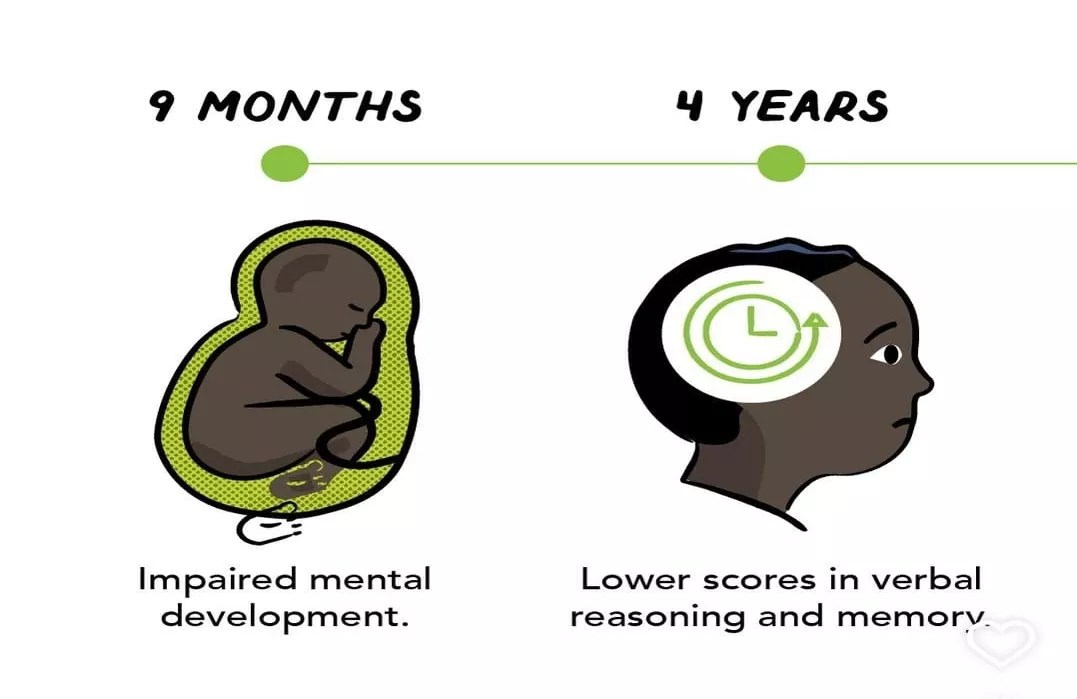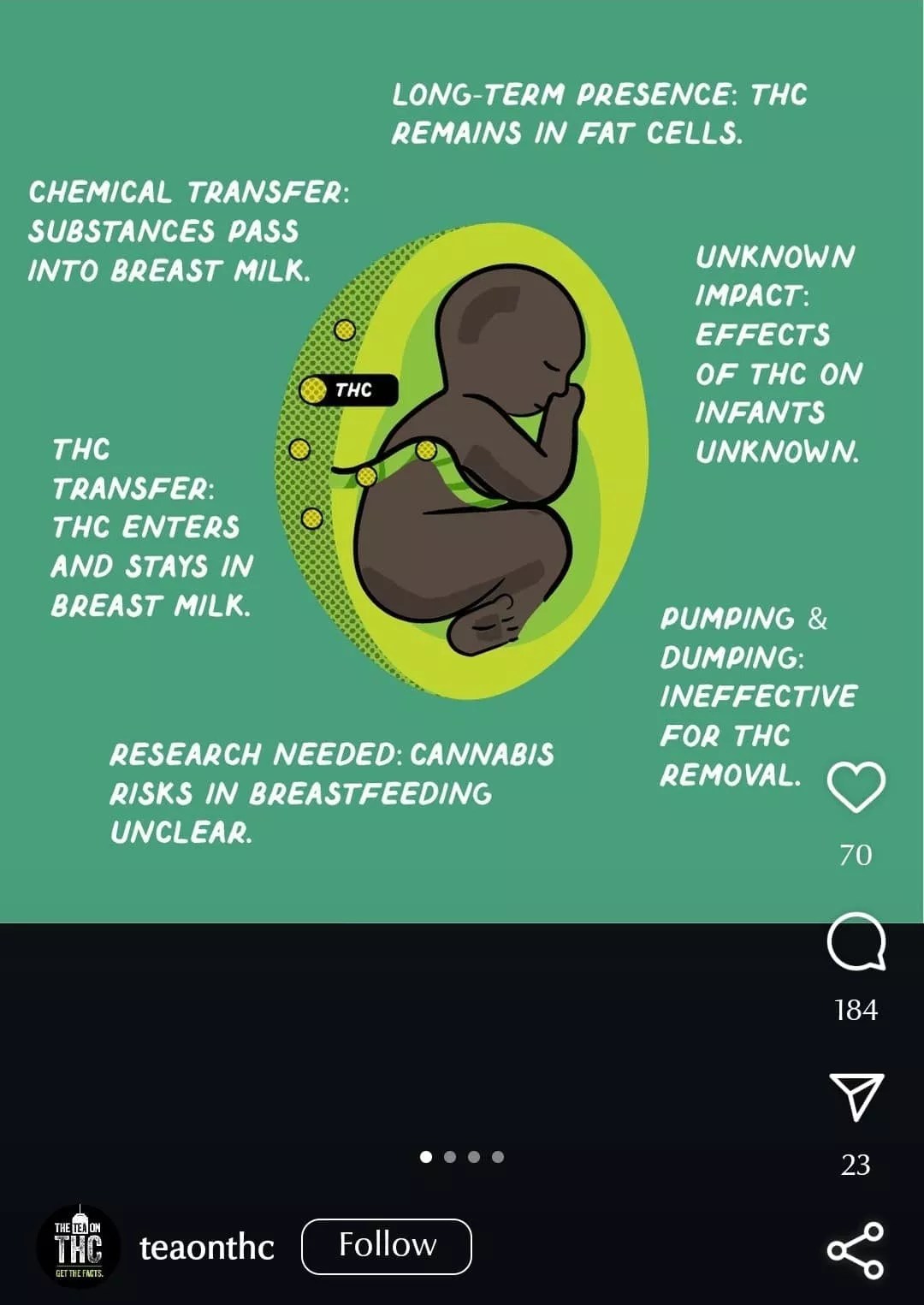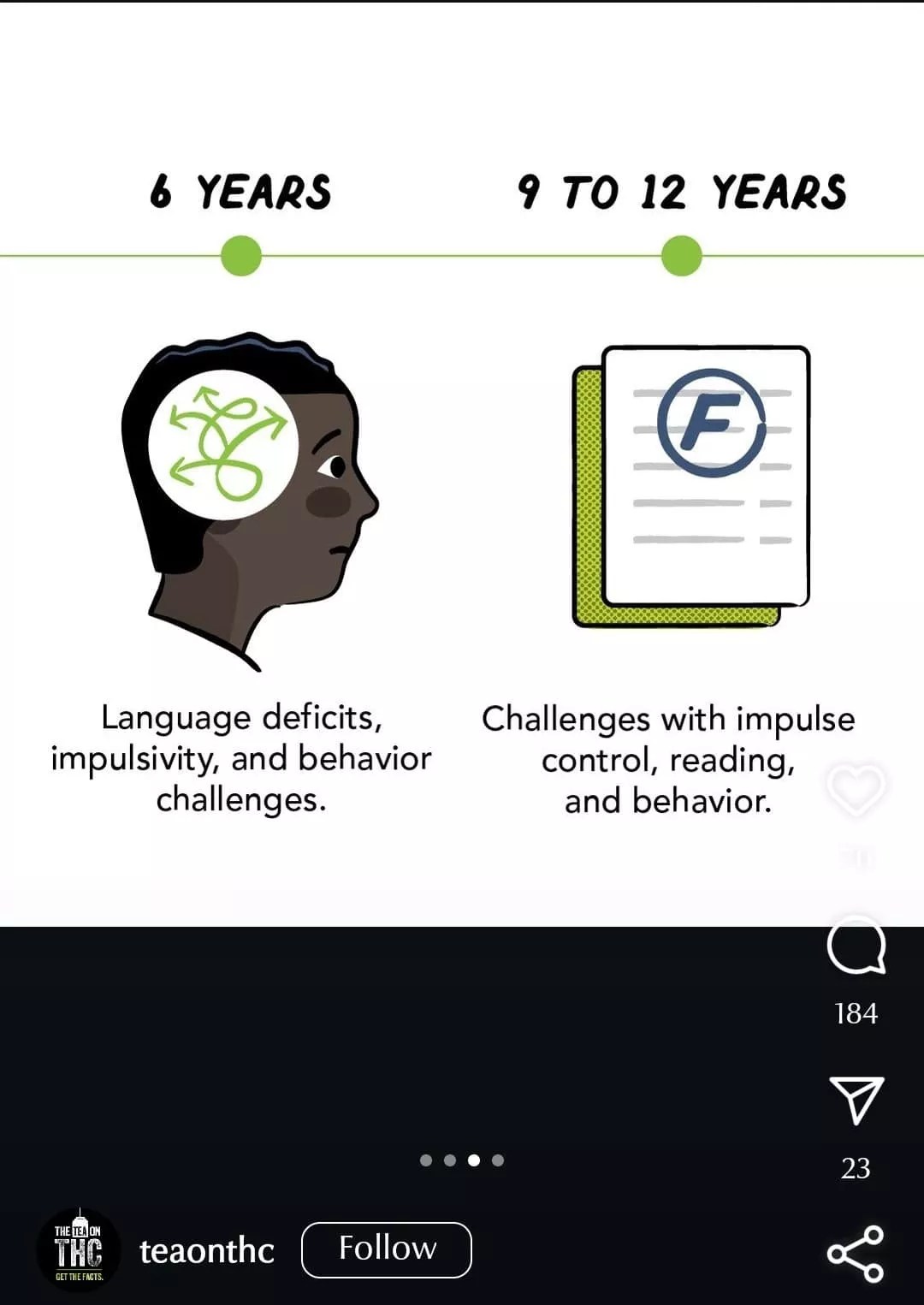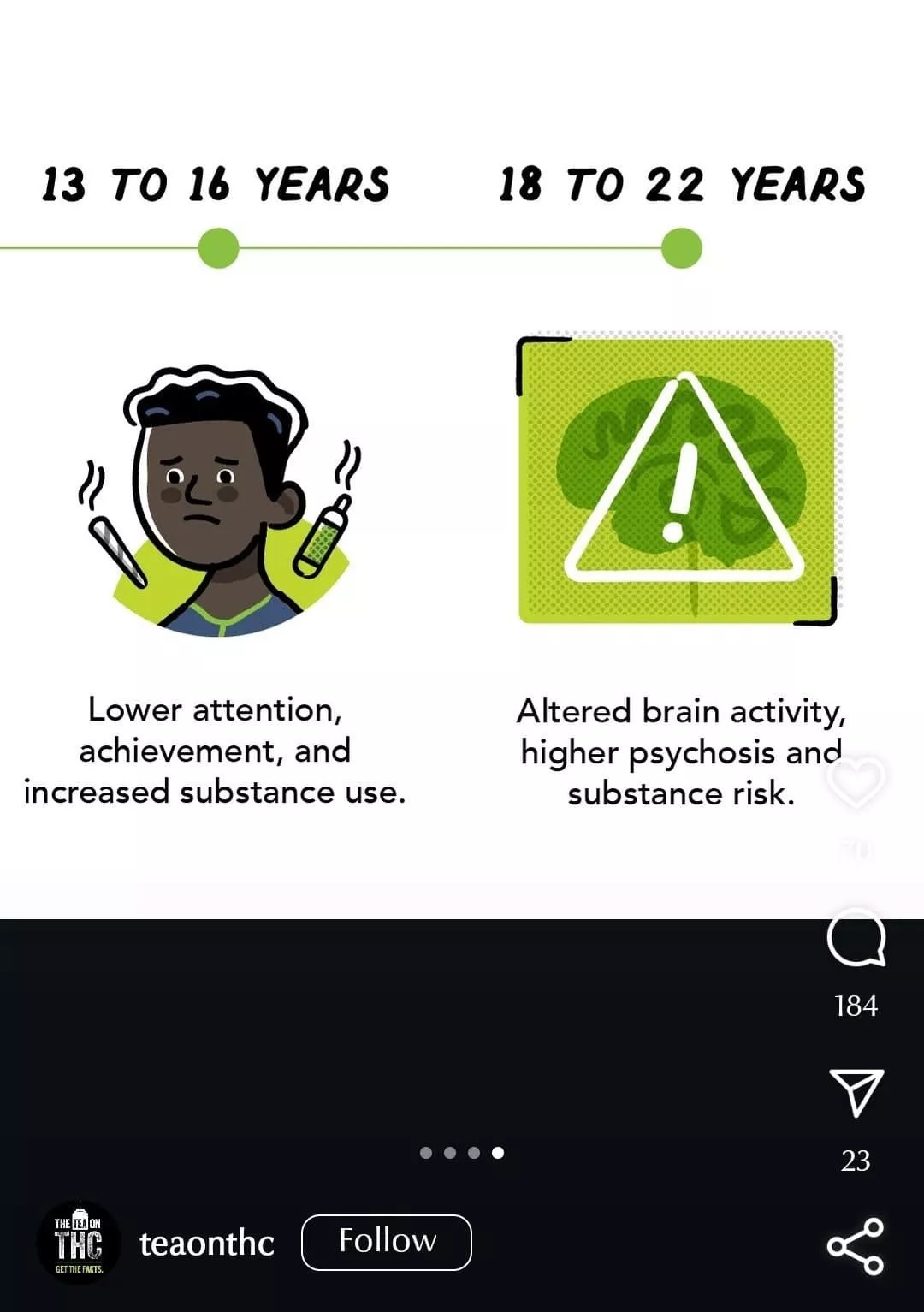
University of Colorado School of Public Health

Audio By Carbonatix
A marijuana public health and education campaign created by the University of Colorado has been called out for racist imagery and suspect science by one of the university’s own regents, leading the CU School of Public Health and a firm that helped craft the campaign to both issue apologies.
A slideshow posted online by The Tea on THC, a state-funded education program created to warn children about the dangers of concentrated marijuana, has been criticized by CU Regent Wanda James, cannabis business owners and other local activists. The illustrations show a Black fetus, child and teenager all dealing with the impact of having a pregnant mother who consumed marijuana.
The graphics mention risks to an unborn child when a mother smokes, vapes or eats marijuana, including issues such as “impaired mental development,” “lower scores in verbal reasoning and memory,” “increased substance use,” “altered brain activity, higher psychosis and substance risk” and “challenges with impulse control, reading and behavior.” At one point, the photos featuring Black characters were included in a now-deleted photo slideshow on the Tea on THC’s social media pages.
“That was shocking to me,” James says of the slideshow. “I’ve been pushing for years to include more inclusive images and thought processes in cannabis, but this was all the most negative connotations, and they just attached a Black face to it.”
According to the most recent data from the U.S. Census Bureau, less than 5 percent of Colorado’s population is Black. Despite the relatively small population, Black people were still twice as likely to be arrested for marijuana possession as White people in Colorado from 2010 to 2018, according to the American Civil Liberties Union.
James, one of the country’s first Black dispensary owners and CU’s first Black female regent in nearly forty years, was an outspoken critic of the lack of social equity provisions in Colorado’s marijuana legalization framework over fifteen years ago. Before winning her seat in 2022, she was a regular presence at state and local marijuana rulemaking discussions in Denver.

The slideshow has also been criticized for the way it presents information despite lacking concrete scientific backing.
University of Colorado School of Public Health
“I have sixteen years invested in this. For sixteen years I’ve been fighting the negative connotations of racism in the War on Drugs and, more specifically, cannabis,” James says. “This time, it kind of hit differently, because I am a regent at this university. …This hits me from every angle from which I’m a human being, as a business owner, as a Black woman, and as an alumnus of this university.”
The graphics were also called out by Jeff Fard, a community activist and the namesake of Brother Jeff’s cultural center in the Five Points neighborhood, as well as Gentleman Quinn’s, a Black-owned marijuana business in Colorado that sells pre-rolled blunts.
The Tea on THC campaign was born out of a bill approved by the Colorado Legislature in 2021 that created restrictions for medical marijuana and extracted THC sales. The proposal, intended to curb teen use of concentrated THC products, also directed the School of Public Health and CU Anschutz Medical Campus to review research on THC’s impact on young people and create a public education campaign, with $2 million allocated for research and $3 million to create the campaign.
The School of Public Health could not be reached for comment, but Dean Cathy Bradley issued a public apology for the images on January 28.
“We deeply regret any distress this has caused and take this matter with the utmost seriousness. We acknowledge and understand that it is our responsibility to ensure our efforts reflect cultural awareness and sensitivity in every aspect of the School’s work,” she said. “ColoradoSPH will take a more active role in overseeing and guiding campaign materials, including ongoing evaluation of community feedback…
“Our work will continue to be grounded in science and proven in practice. These are foundational to public health, and we remain unequivocal in upholding these values and principles,” the apology reads.

The timeline of the slideshow indicates that a pregnant mother’s marijuana use has lasting impact down the road.
University of Colorado School of Public Health
Inititum Health, a Denver-based firm that creates public health and community campaigns, was selected to help craft the Tea on THC materials. According to company principal James Corbett, the intent of the graphics containing Black characters “was not to emphasize that information at the expense of other races.”
He adds: “At the same time, as a person of color, I do understand the historical misinterpretation and that people could be offended by it. That certainly wasn’t the intent…I regret that I have caused pain to people.”
According to Corbett, who is Black, there were multiple versions of the pregnancy slideshow with the same information and young characters of other races. He says the campaign wanted to diversify the people shown in promotional photos and graphics to extend its reach across the state, but “can see how the criminalization of marijuana has been particularly harmful to our communities.”
Corbett says that community feedback from the marijuana industry and People of Color was solicited for the Tea on THC campaign, but “not this imaging, per see.”
On January 28, the Tea on THC’s pregnancy page showed a woman with brown skin; that page now features white women and children.

The slideshow takes readers from prenatal stages to adulthood.
University of Colorado School of Public Health
Science of Marijuana Pregnancy Slideshow Also Under Question
Despite the recent controversy, Corbett stands by the overall message of the Tea on THC, and says he hopes it reaches young people with effective warnings about the effects of concentrated THC vapes, hash and other products. Researchers at CU looked at over 60,000 articles of scientific research to help craft the materials, he notes, with studies showing that the prefrontal cortex of the human brain usually doesn’t fully develop until someone is 25.
Researching the effects of prenatal marijuana use was another legislative mandate of CU’s research project, but peer-reviewed information in that arena isn’t as clear.
According to the National Institute for Drug Abuse, marijuana use during pregnancy “may have harmful effects on a baby’s health after birth,” including lower birth weight, preterm birth and negative impacts on the developing brain, but the NIDA adds these issues are currently “linked” to marijuana use and not direct connections.
“I’d like to have an honest dialogue about the science. …I don’t think anyone wants people under eighteen to smoke, right?” Corbett says.
But James, who opposed the 2021 bill that funded the campaign, isn’t buying the honest dialogue argument – not for the pregnancy portion, anyway. The slideshow’s lead photo includes phrases like “Research Needed: Cannabis Risks in Breastfeeding Unclear” and “Unknown Impact: Effects of THC on Infants Unknown.”
The $2 million scientific review attached to the 2021 bill looked over 66,000 marijuana-related studies but found zero relevant studies related to pregnancy, according to a final report published in 2023 by CU.

CU regent Wanda James and Congressman Joe Neguse (middle) celebrate after their election victories in 2022.
Evan Semon
“None of the studies examined a direct association with cannabis use and health outcomes in pregnant and nursing women or infants/children with prenatal or postnatal exposure. Thus, this probing of the evidence map identified no studies contributing findings relevant to [the] Policy Question,” the report reads.
Corbett admits that more research is needed, but contends that “if we’re unaware of the risks on pregnant moms, we should steer clear” of using marijuana while pregnant.
“Your physician might say reduce your usage, and don’t give up [marijuana]. Those are all individual decisions,” he says. “We’re definitely saying more research is needed…but at the same time, we’re hopefully highlighting the cautionary principle that we ask for those to abstain.”
James says that she’s not trying to tell pregnant mothers or children to use marijuana, either. But she still has an issue with CU’s approach, she notes.
“So, basically, everything you put in there has been somewhat made up?” she argues. “This is not befitting a research university to put out information that is not based in science.”
According to James, she’s spoken with both university President Todd Saliman and CU Anschutz Chancellor Donald Elliman about the pregnancy campaign. The CU regent would like to see the entire Tea on THC campaign pulled, with its remaining funds directed to grants for marijuana business owners who qualify for social equity licenses.